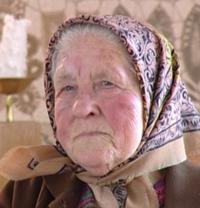“This era and instigations, it all makes me worry. I think about this unsettled situation, who and why wants to elicit these unrests between the Slovaks and the Hungarians. We had a really hard life, but we were satisfied. We went to bed contentedly and got up in the same way. But nowadays… We live in a horrible period of time.”

Download image
Anna Očenášová was born on January 3, 1924 in Komjatice. She finished the elementary school in 1938, only a few months before the Vienna Award was announced. In the period of the Czechoslovak Republic the residents of Komjatice didn’t notice any problems between the Slovaks and the Hungarians; however, in 1938 the situation rapidly changed. The quick course of events, when the mobilisation was proclaimed in Czechoslovakia and propaganda from Budapest stated the Hungary’s annexation of Slovak territory, caused that the family members of Anna Očenášová worried about their fate. The first serious incident in Komjatice happened on December 18, 1938, when the crowd of protesting residents was dispersed, actually there were students demanding retroceding the village to Slovakia, or rather Czechoslovakia. The rally was finally dispersed by violence, arrests and imprisonment of young men in Komárno fortress followed. Deterioration in the economic and social situation also affected Anna’s life. Since there was no work in Komjatice and its neighbourhood, she had to find some seasonal employment at various agricultural homesteads. She used to make some extra money on smuggling food across the borders to Slovakia, from where she also carried back some shortage goods such as clothes, soap, and shoes. It was a very risky activity, for which she was in danger of being deprived of the goods and beaten by the Hungarian border guards. Her older brother joined up the Hungarian military, which was notorious for their cruel attitude to soldiers, so he escaped to Slovakia, where he waited until the end of war. The arrival of a group of armies brought hardship to residents of Komjatice, who had to dig trenches, and hide from bombing in cellars. The most tragic day in the local history was March 25, 1945, when the bombing of village occurred during the church prayer service. Horrified people tried to escape from exploding bombs into a safe place; however, that day 150 residents of Komjatice died. A few days later, the village was liberated by soldiers of the II. Ukrainian Front. Soldiers treated people really rudely, and they plundered houses, stole stocks, raped women, so Anna was in hiding to avoid being one of their victims. Occupation took seven years, but the village and its inhabitants were recovering from the horrors of war much longer and their painful memories didn’t disappear for decades.
